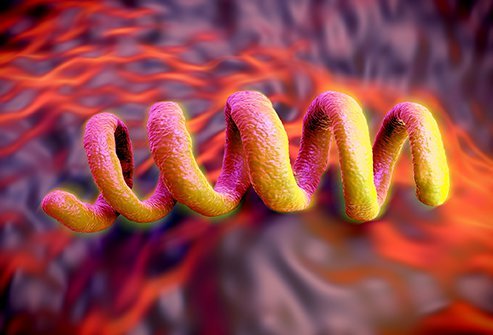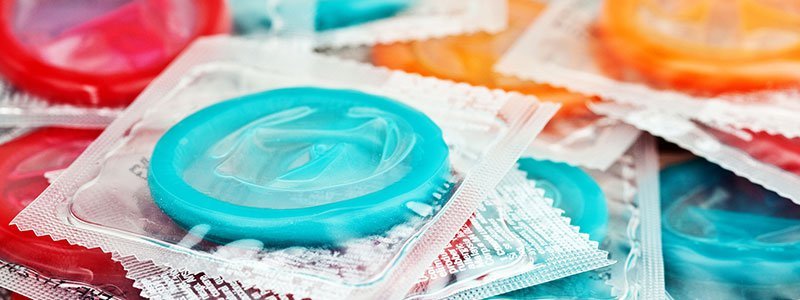What is syphilis?

Syphilis is a sexually transmitted infection. Syphilis is totally curable.
Syphilis is a sexually transmitted infection. This means that it is a bacterial infection mostly spread by sexual contact. The skin or mucous can carry the infection. It first appears as a simple sore on the genital area or the mouth.
Syphilis can be cured early on, but left untreated, it can lead to potential problems that can be life-threatening.
Syphilis is common all over the world. It is also very prominent in southern areas of the United States. It is caused by the bacteria Treponema pallidum. It enters the mouth, skin, or anus during intimate contact.
Syphilis forms a chancre sore at the initial site of the infection. Once the ulcer has formed, the bacteria spread throughout the body and lead to a rash.
What are the signs of syphilis?
Initially, the signs of syphilis could be hard to notice. They come and go, and change over time. It can take up to 3 weeks for the symptoms to appear after you become infected.
Syphilis symptoms include:
- Sores on the penis, vagina, anus, lips, or hands
- Grey or white wart-like growths on the same areas
- A non-itchy rash on the palms of the hand, or soles of the feet that can spread through the body
- Flu-like symptoms (headache, fatigue, high temperature)
- White patches in the mouth
- Swollen glands
What are the four stages of syphilis?
Primary syphilis is stage 1. Usually, after 10 days to 3 months, painless ulcers appear. They can heal alone without treatment, but this does not mean you are syphilis-free.
Stage 2 is secondary syphilis. It begins 2 weeks to 6 months after the ulcer heals. Bacteria travel through the body and cause a rash. Flu-like symptoms may occur at this time. The symptoms can go away in 2 – 6 weeks, but you are still infected, and that is dangerous.
Latent syphilis is stage 3 and this is when the infection “hides”. This stage is tricky because even though you are infected, you could go up to 20 years without any symptoms. You may have an occasional “flare-up” of symptoms, but that is more common in the first year of stage 3.
Late or tertiary syphilis is stage 4. One in every four people who don’t get treatment will get this type of syphilis, which can damage any organ in the body.
What are the risk factors for getting syphilis?
You may be at risk for syphilis if:
- Have several sex partners
- Have unprotected sex
- Are infected with HIV
You can get syphilis if any part of your body comes into contact with the ulcer or rash of someone with syphilis. This happens most often during sex.
How is syphilis diagnosed?
Syphilis can be diagnosed using samples of blood or cerebrospinal fluid. Blood tests can tell if antibodies are present that fight infection. Syphilis-causing bacteria triggers antibodies that can stay in your body for years. This helps the doctor to conclude if your infection is a current or past infection. If there is a suspected neuro complication from syphilis, the doctor may perform a lumbar puncture to sample your cerebrospinal fluid.
If you are diagnosed with syphilis, your health department or the Center for Disease Control can help you get in touch with past sexual partners that can be infected. They can then be tested and treated to limit more spreading of the infection.
Is syphilis curable?
Syphilis is totally curable. The first-choice treatment for syphilis is the antibiotic penicillin. Your antibiotic can be given as a capsule, tablet, or injection. Your doctor may choose to start your treatment even before your test results come back. The length of time needed to treat you depends on which stage of syphilis you are in. You should follow up with your doctor to make sure the disease is completely gone once treated.
On the first day after treatment, you may experience a Jarisch-Herxheimer reaction. This is a series of chills, nausea, aches, and fever that usually lasts no longer than a day.
What happens if syphilis is not treated?
Without treatment, syphilis can cause numerous complications in every system of the body. It can increase the risk of HIV infection and lead to problems during pregnancy. Treatment can stop further damages but cannot reverse damage that has already occurred.
Bumps can develop on the bones, skin, liver, or other organs in late-stage syphilis. There are numerous neurological problems that syphilis can cause as well. These can include:
Cardiovascular problems like swelling and bulging of the aorta can occur. Other blood vessels can sustain damage, and syphilis can also damage your heart valves. People with syphilis or any genital ulcer can have a risk of contracting HIV because the lesions bleed easily and allow a way for HIV to contaminate the bloodstream during sex.
If you have syphilis and are pregnant, you can pass the bacteria on to your baby. This is called congenital syphilis and increases the risk of stillbirth, miscarriage, or premature death of your baby shortly after birth. A pregnant mom has to be treated with penicillin.

QUESTION
Condoms are the best protection from sexually transmitted diseases (STDs). See Answer
What can be done to prevent syphilis?
You can do many things to stay safe and decrease the risk of getting syphilis. Not having sex is the only guarantee of avoiding infections. If sexually active, you and your sexual partner should have a complete physical check-up. This is beneficial because you can test for numerous sexually transmitted diseases like syphilis, herpes, gonorrhea, genital warts, chlamydia, and trichomoniasis.
Consider using a condom while engaging in vaginal or anal sex. Use the condom to cover the penis or a plastic dam to place over the vagina during oral sex. Bear in mind, though, that condoms will not completely stop the risk of infection. This is because they are not indestructible and do not cover rashes and ulcers on other parts of the body.
Lastly, make sure you and your partner complete treatment and are deemed disease-free if you have previously had syphilis.
Latest Sexual Health News
Daily Health News
Trending on MedicineNet
Medically Reviewed on 7/15/2022
References
Mayo Clinic: “Syphilis.”
National Health Services – UK: “Syphilis.”
New York State Department of Health: “Syphilis.”